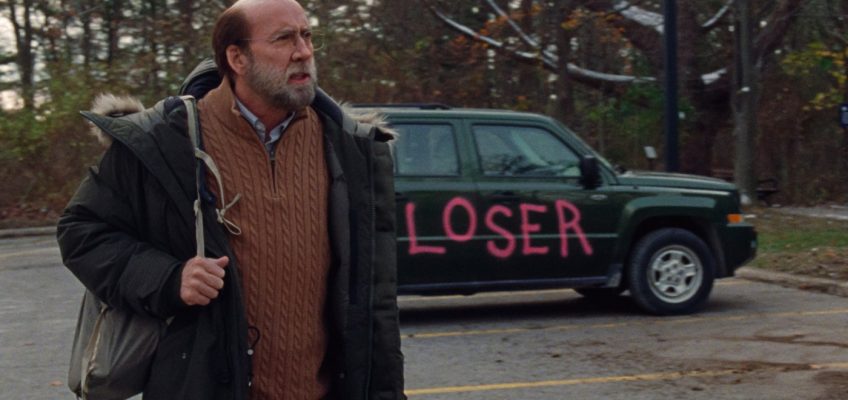Writer/director Kristoffer Borgli is interested in attention. Specifically, he’s interested in the paradoxical postmodern predicament of our addiction to attention, and the ways in which capitalism constantly cannibalizes it, chewing through our time, neurons and emotions like Pac-Man. In his debut feature “Sick of Myself,” set in his native Oslo, Norway, Borgli tracked one young woman’s desperate bids for attention through a series of contrived situations to showcase her suffering and martyrdom. In his second feature, “Dream Scenario,” Borgli sets his sights on America, and imagines what happens when someone gets too much attention for doing nothing at all.
The script for “Dream Scenario” feels like three ideas loosely woven into one absurdist screenplay. The first strand is the oddball but oddly simple premise based on a relatably awkward notion: what if everyone in the world started dreaming about one person? The subject in question is the profoundly average Paul Matthews (Nicolas Cage), a floundering evolutionary biology professor, husband and father of two.
Suddenly, he starts popping up in everyone’s dreams, and becomes the most famous man in the world through no effort of his own. So often overlooked in his everyday life, Paul is cautiously elated that everyone is talking about him. Perhaps there’s a chance to publish his book?
The second story strand is an exploration, of sorts, of cancel culture, or that time-honored tradition of collectively placing a public figure on a pedestal only to tear them down. Paul doesn’t necessarily garner adoration as the benevolent dreamland pal, but a strange sort of curiosity, and the focused mass attention on him irreparably changes his life.
When the dreams about him become violent, with Dream Paul as the aggressor, the masses — particularly his students at fictional Osler University — turn on him, through no fault of his own action. This line of argument is the most muddled in the film, mostly because Paul is an almost entirely passive figure, and it unfairly pokes fun at contemporary campus culture but doesn’t have any bite.
The third strand is the scantiest, but the most successful: an eviscerating satire of attention capitalism. At the advent of his inexplicable stardom, Paul is courted by a social media agency called “Thoughts?” staffed by characters played by Michael Cera, Kate Berlant and Dylan Gelula, who pitch him as a Sprite spokesman and claim they can call Barack Obama on his behalf.
Lily Bird, left, and Nicolas Cage in “Dream Scenario.” (Jan Thijs/A24 Films/TNS)
After Paul has been societally chewed up and spit out, a market rises in his wake, and Borgli presents a savage parody of a new kind of influencer using a technology inspired by Paul. The “dreamfluencer” (imagined as a group of diverse, winsome 20-somethings cohabitating in a sprawling L.A. mansion) can visit anyone’s dreams and sell them sneakers, supplements or a hot new track. The subconscious: advertising’s final frontier.
Borgli has a lot of ideas, and perhaps wove a few too many into “Dream Scenario,” which is busy with cultural commentary but not exactly deep. He has an absurdist perspective on American culture, and seems at once perplexed but also curious about the possibilities of America’s hypocritical relationship to fame and industry.
Thankfully, Borgli has the formidable Cage to hold this all together through sheer force of will, whose hyper-stylized acting lends to the surreal comedic happenings. Cage throws himself into Paul’s incredible averageness, and as always, Cage imbues an incredible amount of pathos and vulnerability in his performance. We ultimately feel for Paul because of Cage, who expresses how hard Paul is trying just to be liked, respected and loved.
Borgli’s visual approach to the dreamlike logic of “Dream Scenario” is to marry the average and the absurd, the banal and the baroque. The scenes look perfectly normal, but there’s a strangeness and humor to the edit (Borgli also edited the film), or a bizarre camera angle (the cinematographer is Benjamin Loeb) that lends to the distinct sense of something being off, which also helps to blend the dream sequences with reality — you never know what’s what, so there’s a sense of creeping unease the entire time.
“Dream Scenario” itself is a lot like a dream: there are big sweeping ideas, but they don’t all cohere into a logical narrative. Like a dream, you’re left with thoughts and impressions to mull over for a long time. These sticky images and profound ideas lodge themselves in place, even if you’re not quite sure they all fit together.
‘Dream Scenario’
2.5 stars (out of 4)
MPA rating: (R for language, violence and some sexual content)
Running time: 1:42
How to watch: In theaters Friday
Related Articles
Movie review: ‘The Marvels’ skips along with zippy humor, lightness
7 Thanksgiving movies to stream this month
What to watch: ‘The Holdovers’ could be a new holiday classic
What it takes for a movie to get a rare ‘F’ CinemaScore — and why it’s a badge of honor
How Meg Ryan got back in the rom-com game


Leave a Reply